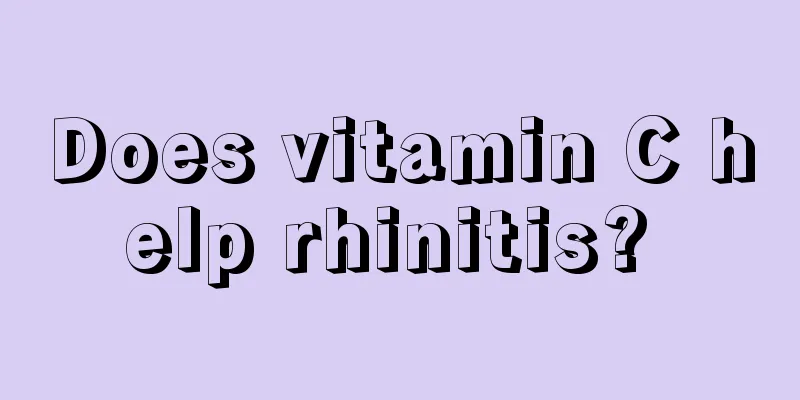Does vitamin C help rhinitis?

|
Allergic rhinitis has been bothering many people, not only affecting physical health, but also affecting life. Many people have been fighting against rhinitis and have tried many methods to treat or improve it. So how should allergic rhinitis be relieved? What foods can effectively relieve the symptoms of allergic rhinitis? 1. How does allergic rhinitis develop? Professor Liang Donghui from the Department of Traditional Chinese Medicine at Zhujiang Hospital of Southern Medical University said in an interview with Family Doctor Online that allergic rhinitis is a non-infectious inflammation of the nasal mucosal tissue; it is a chronic nasal disease with a series of nasal symptoms caused by a specific reaction between external allergic substances and the immune defense cells of the nasal mucosa. Pollen, lice, cold air, chemicals such as exhaust gas, and stress can all cause it. The pathogenesis of allergic rhinitis is that foreign matter invades the body, causing the body to produce antibodies corresponding to the antigen. The combination of the two causes an antigen-antibody reaction, which causes effector cells to release active substances such as histamine, thereby leading to an allergic reaction. The released histamine can stimulate the parasympathetic nerves, making them abnormally active, resulting in symptoms of allergic rhinitis such as sneezing, clear nasal discharge, and nasal itching. 2. The role of vitamin C Taking more vitamin C can help relieve the symptoms of allergic rhinitis. Vitamin C can inhibit the production of histamine in the body, improve capillary permeability, reduce the exudation of tissue fluid, and thus alleviate symptoms. Foods such as fresh dates, tomatoes, and kiwis are rich in vitamin C. Patients with allergic rhinitis may consider increasing the intake of these foods or taking vitamin C supplements as appropriate. Suitable for people 1. People who get tired easily. 2. People working in polluted environments. People with high levels of vitamin C in their bodies will hardly absorb harmful elements such as lead, cadmium and chromium. 3. People who are addicted to smoking. Smokers eat more foods containing vitamin C to help improve cell It strengthens the resistance of cells, maintains the elasticity of blood vessels, and eliminates nicotine in the body. 4. People who engage in strenuous exercise and high-intensity labor. These people will lose a lot of vitamin C due to excessive sweating and should be replenished in time. 5. Patients with scurvy. This disease is caused by a lack of vitamin C in the diet, which leads to poor formation of connective tissue and increased fragility of capillary walls. You should eat more foods rich in vitamin C. 6. People with pigmentation spots on their faces. Vitamin C has an antioxidant effect. Supplementing vitamin C can inhibit the formation of pigmentation spots and promote their disappearance. 7. People who take medication for a long time. Taking aspirin, sleeping pills, anti-cancer drugs, tetracycline, calcium products, contraceptives, antihypertensive drugs, etc. will reduce the body's vitamin C and may cause other adverse reactions. Vitamin C should be supplemented in time. 8. Patients with cataracts. Vitamin C is a nutrient element of the intraocular lens. Insufficient vitamin C intake is one of the factors that lead to cataracts. Patients should supplement more vitamin C. 3. What can patients with allergic rhinitis eat? 1. Enoki mushroom: This is also a food that helps prevent allergic rhinitis. Regular consumption of Enoki mushroom is beneficial for eliminating heavy metal ions and toxins and waste produced by metabolism. 2. Carrots: Recently, Japanese experts discovered that the beta-carotene in carrots can effectively prevent allergic reactions such as pollen allergies and allergic dermatitis. 3. Honey: It is best to drink a spoonful of honey every day. Because honey contains trace amounts of bee venom. It is clinically used to treat allergic diseases such as bronchial asthma. Honey contains a certain amount of pollen grains. Drinking it regularly can develop a certain resistance to pollen allergies. 4. Jujube: Japanese scholars have found that red dates contain a large amount of anti-allergic substance - cyclic adenosine monophosphate, which can only temporarily prevent the occurrence of allergic reactions. It is better to break the jujube into pieces when decocting in water, and it is not advisable to add sugar during the decocting process. 4. Vitamin C – Lemon Shortly after I fell ill the year before last, I happened to see a recipe in a book that said lemon juice had a special effect in treating allergic rhinitis. I was very happy and tried the remedy: I bought 500 grams of lemons (5 in total), washed them, cut them all into semicircular slices, put them in a large box, then soaked them in 500 grams of the best honey, and put them in the refrigerator. The next day, take out four or five slices of lemon and two spoons of lemon honey juice, add about 5 times the amount of water and drink it (eat the lemon with the skin). Take it for 3 consecutive days, twice a day. The effect was very good after taking it on the first day, and after 3 days, the symptoms were basically relieved. Later, I consulted a doctor and realized that lemon is rich in vitamin C, which can reduce the permeability and fragility of capillaries, improve blood circulation in the upper respiratory tract, and strengthen the nasal and throat mucosa, hence its therapeutic effect. Patients with allergic rhinitis should eat more foods high in vitamin C to help recover from the disease. In addition to lemons, grapefruit, oranges, tangerines, apples, strawberries, kiwis, tomatoes and various green leafy vegetables are also rich in vitamin C. |
<<: Is washing the nose with saline effective for rhinitis?
>>: How does Houttuynia cordata treat rhinitis effectively?
Recommend
What diseases can levofloxacin capsules treat
Levofloxacin capsules are also called levofloxaci...
Why can't you live together after medical abortion
Medical abortion is a common method of abortion f...
The advantages and disadvantages of using a silver comb
The benefits of using a silver comb are mostly th...
How to deal with phlebitis caused by infusion?
Although intravenous infusion is a very commonly ...
What is the treatment for left ovarian teratoma
Patients with left ovarian teratoma need to see a...
Is otitis media serious? What are the dangers?
People don't take otitis media, a common dise...
Can I drink sesame paste if I have gastroenteritis?
Sesame paste is a particularly delicious food. Ma...
What to do if kidney cancer metastasizes or spreads
In recent years, kidney cancer has become one of ...
How long does chemotherapy and radiotherapy last before rectal cancer surgery?
The short-term effect of radiotherapy and chemoth...
How much does it cost to treat bone cancer
Bone cancer has many clinical manifestations. Pat...
What is the production principle of fermented bean curd?
Fermented bean curd is a very common thing. More ...
The harm of fake eggs
In our daily life, eggs are a nutritious product ...
Can I drink honey if it smells like sprinkles?
Honey is a good drink that can be consumed all ye...
What is the cure rate of early laryngeal cancer
Even if many patients adopt the above treatment m...
It is very important to pay attention to the care of cardiac cancer in daily life
The occurrence of cardia cancer is actually very ...









